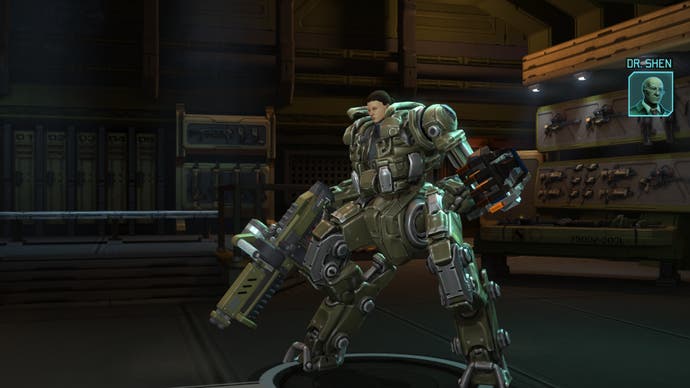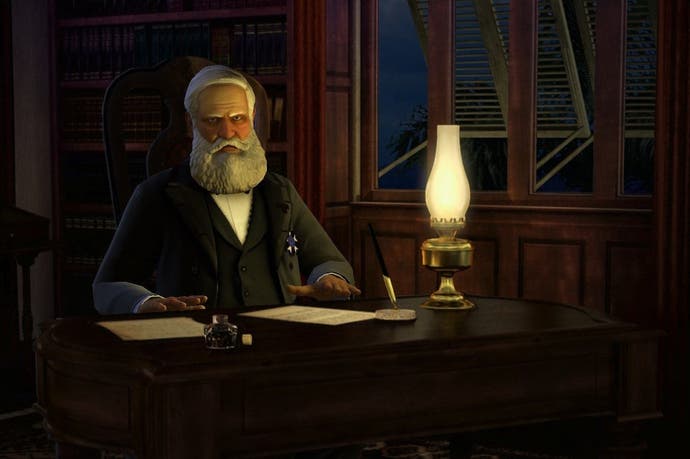Expansions are back, but what makes them great?
An ode to Dom Pedro II.
I had to kill Dom Pedro II of Brazil before I could realise that he was actually my kind of people. That's the power of Civilization games, right? Victory leads you away from the PC and over to the bookshelves where you learn about the tech you used and the people you crushed. And man, I crushed Pedro II quickly: around the two-hour mark in an 11-hour game. The rest of us civs were starting to get armies and economies going. We were starting to expand and to sprout new cities and to think about the finer things in life. Pedro, though? It was clear that Pedro wasn't going to make it. He had two cities and, in the bizarre economy of Civ 5, a population of about four or five citizens. He came last in all the lists that mattered. He was gloomy and heavy-browed when he popped up in negotiations, like a department store Santa who was aiming for 'portentous' rather than 'jolly'.
So I wiped him out. I told myself it was as a service to him, although I might cannily have been eyeing the resources he was sat on, and been wary of Brazil's late-game culture bonus Carnival, which has earned this particular civilisation the nickname Pedro's Party People. Whatever the reason, once Pedro was gone I hit the books, and what I learned was rather disheartening. Pedro II seemed like a really good guy - he shouldered the sacrifices of a leadership role he'd never wanted, and he held together an empire that was on the verge of disintegration. He became buddies with notable humans like Louis Pasteur, whose milk tricks I have been enjoying for years. He abolished slavery. Those sad eyes, that hooded brow? They were his trademarks in real life, too. He was kind, thoughtful, troubled even, and by the time I learned that the man I'd just killed was known by his country as 'The Magnanimous', well, that's kind of the worst thing you can learn about the man you've just killed.
Since then, I always choose Pedro whenever I play Civ 5 - partly because of the Carnival bonus, certainly, but mostly because he's come to define the game for me. But here's the really crazy thing: up until the Brave New World expansion, Pedro wasn't in Civ 5. Expansions, eh? Magical things, and we've had some beautiful examples of late. Do expansions get enough appreciation?

Just look, for a second, at Brave New World. It doesn't only introduce Pedro II and the glorious civilisation of Brazil, it chucks in another handful of civs alongside it, including Poland with some nutty winged troopers who were apparently every bit as grounded in history as Pedro himself. It also chucks in a range of new scenario maps, including a brilliant Scramble for Africa mode that proves, amongst other things, that I should never try to scramble for Africa. Oh yes, and it tidies up the Civ endgame. It tries to fix the last two Xs of a 4X, if you will, offering a cultural victory that, while a little weird, is now every bit as satisfying as the military victory. More so, even, if it's Pedro powering you up the rankings.
Brave New World isn't alone. This is the joy of expansions. We can fall into the trap of thinking they're just more levels, or a chunk of fresh campaign. We can tangle them up with standard downloadable content as another thing to pay for if you want to get all the Achievements. But a good expansion is a little piece of revolution. It might fit within the existing game and remix it, rather than merely replicating it, like so many sequels or DLC campaigns do. Along the way, it might give that existing game back to you, refreshed.
We've covered Brave New World, with its beefed up victory options, but how about XCOM: Enemy Within, which takes all that's glorious about Jake Solomon's marvellously cruel strategy grinder and adds mechs? Mechs! Or Reaper of Souls, a game that brings two years' worth of experience to Diablo 3 by all but stepping away from the tyranny of the campaign in favour of a strategy you might call 'endless endgame'. A game that somehow leans down into itself (perhaps from that famous lofted viewpoint) and ignores the obvious outlines as it sifts all those skills, loot items and possible builds through its inventive fingers, before squeezing them back together into something glistening with devilish unpredictability.
Not one of these games is without its problems, perhaps, but isn't that part of the glory of an expansion too? With standard DLC you have to provide more of the same, it often seems. With a sequel you have to solve stuff (or you have to at least tell the punters that's what you're doing), either fixing what's broken or going bigger, which might explain why so many series start off with their feet on the ground and end up in the 'Late Brosnan' period of cheery cultural decline. Expansions, though, don't have to fix anything or escalate things in search of relevance. They can be pure secondary plot, like Opposing Force, and change the focus of Half-Life from the nerdy scientist trying to escape all those awesome abseiling special forces guys to one of those awesome abseiling special forces guys hot on the heels of nerdy scientists. They don't even have to be canon - they can be pure B-side, like Blood Dragon, and drench the existing framework of Far Cry 3 in the glorious 80s neon glow of Michael Biehn for no good reason.

Sometimes you even get expansions masquerading as sequels, for whatever reason, but if anything they're the exceptions that prove the rule. We Love Katamari is an ancient example - a sort of protest game from Keita Takahashi, who quite rightly concluded that Katamari Damacy was not in need of a sequel and instead delivered the King of All Cosmos' own Goldberg Variations, a disc full of meddling and tinkering that was rivetingly inventive from start to finish. Takahashi then disappeared off to build playgrounds and make curios like Noby Noby Boy, while Namco did its best to ruin Katamari's memory with actual sequels that proved his original point. A more recent, less successful sequespansion is Gears of War Judgment, where tightly wound mini missions with specific win conditions couldn't quite carry a full game, but probably would have made for a tidy little Gears of War 3 expansion under different circumstances. (Speaking of judgement, I will accept any and all that I have coming for 'sequespansion'.)
It feels a little like expansions quietly went out of fashion somewhere along the line. Maybe content patches whittled away at their domain, maybe people wanted something new from a series each time, or maybe other people just wanted to sell them something new regardless. Whatever happened, it's good to have expansions back in rude health again, and with such a richness to the way they enhance and remix the games they sit within. That remixing - that disruptive instinct that looks back at the host game and ignores things like balance and tradition - is key to their appeal and their success. And if there's a lesson from that success, which we've seen recently with things like Blood Dragon, it's that you can quite happily have expansions and sequels. While the main team gets on with the proper sequel, a crack team of anarchistic developers can dive back into the game that just ended and remake it in whatever image seems most exciting, most radical. And everyone wins.
I doubt this lesson is lost on the accountants, incidentally, but when expansions are done correctly, we should all be poised to benefit. So don't condemn your last game to the trash heap just because you want to put out another box. Expand! The world certainly needs Civilization: Beyond Earth, but if you ask me, it is also much the richer for my old friend Pedro II.

